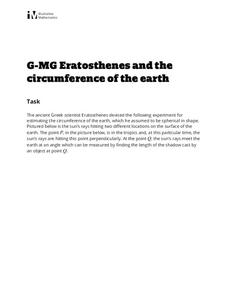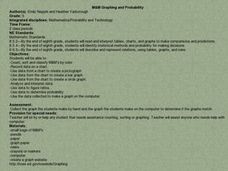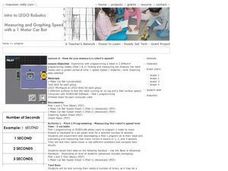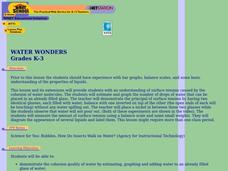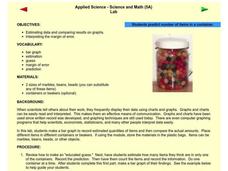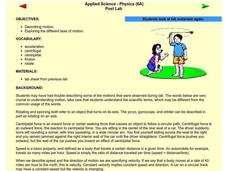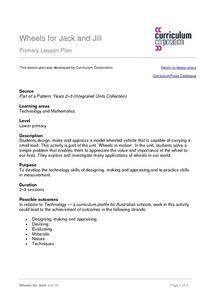Statistics Education Web
It Creeps. It Crawls. Watch Out For The Blob!
How do you find the area of an irregular shape? Class members calculate the area of an irregular shape by finding the area of a random sampling of the shape. Individuals then utilize a confidence interval to improve accuracy and use a...
Perkins School for the Blind
The Price is Right
Go on a shopping trip to practice estimation, price value, and shopping skills. The class heads off to the market to purchase several items for the activity. While they are there, they discuss the cost of various foods and even...
Curated OER
Forms of Exponential Expressions
Your young physicists analyze the forms of four equivalent exponential expressions representing an amount of a radioactive material in a substance. They show how each expression is equivalent to the others and what aspects of the decay...
Illustrative Mathematics
Eratosthenes and the Circumference of the Earth
The class gets to practice being a mathematician in ancient Greece, performing geometric application problems in the way of Eratosthenes. After following the steps of the great mathematicians, they then compare the (surprisingly...
Marine Institute
Water Pollution
Sixth graders investigate the various types of pollutants found in water and ways to help prevent water pollution. Through a hands-on experiment, students create samples of polluted water by mixing water with vegetable oil, dirt,...
Curated OER
Operations with Fractions and Decimals
Complete a instructional activity that introduces and explores operations with fractions and decimals. Pupils estimate the reasonableness of a decimal computation. Then discuss what operation is needed to find an answer. Handouts, web...
Curated OER
Estimation & Central Tendency
Eighth graders view pictures that show many objects, estimate amount that they think they saw, and take class data from estimation to find the mean, median, mode, and range for the class.
Curated OER
Measurement Masterpiece
Here is a good, cross-curricular measurement and estimation lesson. Learners practice measuring paper strips to create an art project. This is a great way to introduce the ruler, and how it used, to your students.
Intel
Metric Madness
Scholars learn about the metric system and produce a presentation on how to convert within the metric system. They then develop a brochure in support of legislation requiring the use of the metric system.
Curated OER
Water Wonders
Young scholars measure the amount of surface tension using a balance scale after a classroom demonstration students diagram the appearance of several liquids and label them.
Curated OER
Ready for Roots
Fourth graders sort seeds and predict what conditions are needed for them to germinate. They keep the seeds moist, observe and measure their growth and graph the results. As the seeds start to grow students compare and contrast the each...
Curated OER
Apples Aplenty
Learners identify a variety of apples. For this agriculture lesson, students examine various types of apples and sort them according to attributes. Learners describe the apple and create a word web. As an extension activity, students...
Curated OER
Scavenger Hunt for Lengths
Students practice measurement using real world objects. In this scavenger hunt for lengths lesson, students collaborate to measure with rulers, yardsticks, trundle wheels, and tape measures. Students must estimate the length then...
Curated OER
M&M Graphing and Probability
Young scholars sort, classify, and graph M & M's. They create pictographs and bar graphs with the colors and numbers in each bag of M & M's. They calculate the ratio and probability based on class results.
Curated OER
Percents: What's the Use?
Learners explore percentages in real world situations. In this percents instructional activity, students determine the final sales price after discounts. Learners interview community members and determine how percentages are used in the...
Curated OER
Percents: What's the Use
Students research percentages in real world situations. In this percents lesson, students demonstrate their ability to apply percents to everyday situations. Students communicate mathematically by conducting interviews about percents and...
Curated OER
Introduction to Lego Robotics
Learners utilize computer programs to operate a simple robot. In this technology activity, students create robots using Lego pieces and simple motors to move them. Learners measure the speed of the robots by running Robolab...
Curated OER
Sports Participation
Students research statistics about sports participation in references such as the Statistical Abstract of the United States. They make and analyze a list of the 10 sports that the highest number of Americans participated in on an amateur...
Curated OER
Internet Measurement
Students become familiar with how to get information from the Internet. In this math and technology lesson plan, students measure objects on a measurement sheet found on a web site. They practice using a standard unit of measurement...
Curated OER
Water Wonders
Young scholars experiment with the cohesion of water molecules. In this surface tension lesson, students estimate how many drops of water a full glass can take before overflowing. They watch a video that explains water molecules.
Curated OER
How Big is a Breath?
Students demonstrate how to use math skills to measure their lung capacity. In this human biology lesson, students use a clear plastic container, measuring cup and rubber balloons to demonstrate how the lungs work. Students estimate the...
Curated OER
Applied Science - Science and Math Lab
Learners make a prediction. In this applied science lesson, students guess the number of items in a jar. Learners create a bar graph to show the predictions and the actual amounts.
Curated OER
Laws of Motion
Young scholars explore centrifugal and centripetal force. In this motion lesson, students expand on their knowledge of motion to study velocity, acceleration, and friction. Young scholars examine multiple objects to demonstrate the laws...
Curated OER
Wheels for Jack and Jill
Learners design, make and appraise a model wheeled vehicle that is capable of carrying a small load. This activity is part of the unit `Wheels in motion'.



